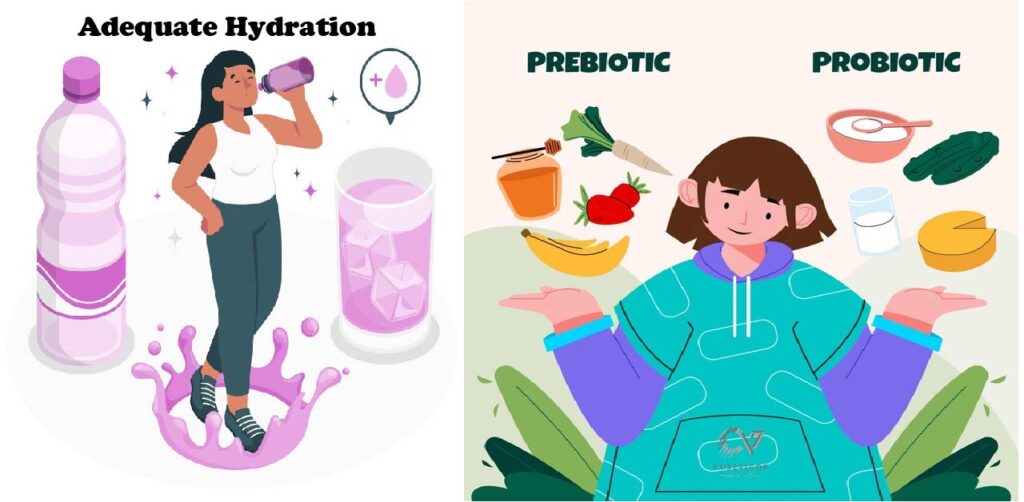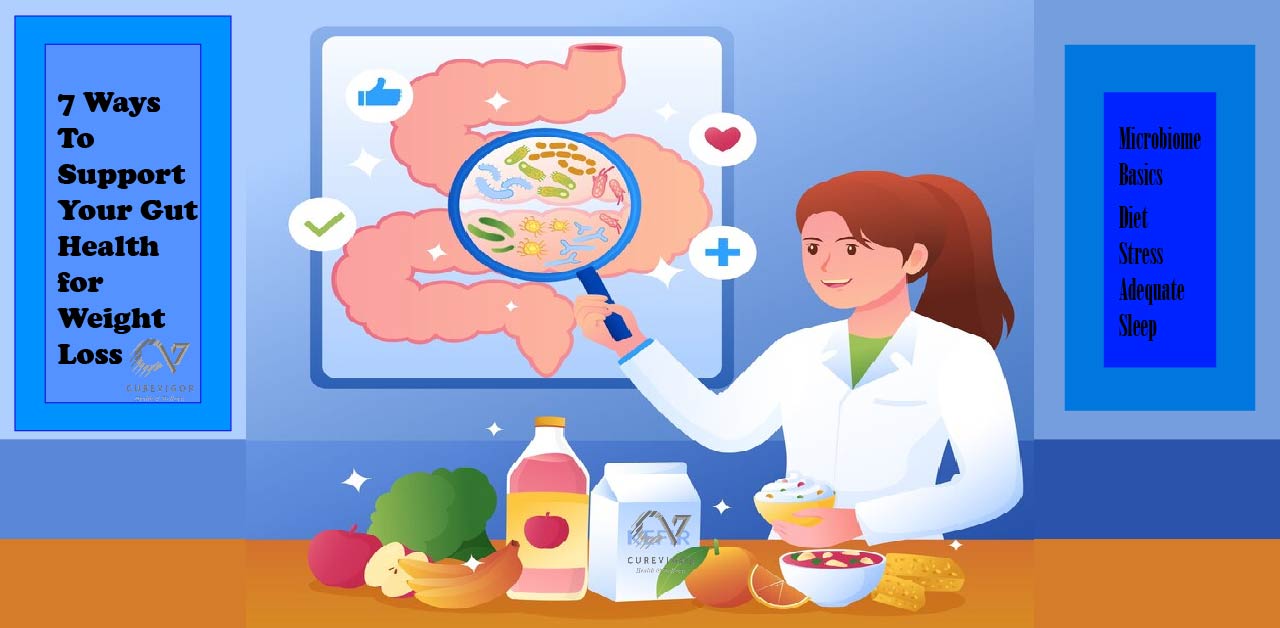In the quest for a healthier lifestyle, gut health has become crucial to overall well-being, including weight management. Good gut health helps with weight loss.
Contents
Understanding Gut Health
Microbiome Basics
A healthy gut is critical to overall wellness, and the microbiome plays a crucial role. This intricate ecosystem comprises trillions of microorganisms, including bacteria, viruses, and fungi.
Together, they work to support digestion, nutrient absorption, and immune system function.
Prioritizing gut health means prioritizing your overall health.
Gut-Brain Connection
It’s fascinating to know that our gut and brain are in constant communication with each other through what is known as the gut-brain axis. This two-way flow of information significantly impacts various aspects of our health, including digestive functions, emotional stability, and weight management. It’s incredible to think that the food we consume and the state of our gut can profoundly affect our mood and overall well-being.
7 Ways to Support Gut Health for Weight Loss
Balanced Diet
Maintaining good health and well-being depends on having a healthy gut. A well-balanced diet is the foundation for maintaining a healthy heart. It is necessary to include a variety of foods in your diet that can provide your microbiome with the essential nutrients it requires to function at its best.
Consume fruits and vegetables to maintain good health, providing essential fiber, vitamins, and minerals. These nutrients help to promote the growth of healthy bacteria in your gut. Whole grains are also great for digestion and supporting regular bowel movements due to their high dietary fiber content. Consume lean proteins like chicken, fish, and tofu for tissue building and repair.
Eat these foods to improve your digestion and nourish your microbiome. To maintain a healthy gut, you should limit processed foods, sugary drinks, and unhealthy fats.
You need to maintain a healthy gut to be physically and mentally fit. Eat well to maintain optimal gut health.

Probiotics and Fermented Foods
Probiotics and fermented foods benefit your gut health as they help introduce good bacteria into your digestive system. Improving the diversity of your gut microbiome with these helpful bacteria is essential for overall health and well-being. Some excellent choices for fermented foods include yogurt, kefir, sauerkraut, and kimchi. Yogurt and kefir are dairy-based fermented foods that contain live cultures of bacteria and yeast.
It’s a fact that fermented foods such as kefir, yogurt, sauerkraut, and kimchi are packed with high amounts of probiotics that can effectively reduce inflammation, improve digestion, and ramp up your immune system. Eat these foods with essential vitamins, minerals, and antioxidants to boost your health. You can quickly and enjoyably improve your gut health and well-being by including them in your diet.
Prebiotic-Rich Foods
Consuming prebiotic-rich foods is essential to promoting the growth of beneficial bacteria in your gut. Prebiotics are indigestible fibers that nourish good gut bacteria. Consuming prebiotic-rich foods, like garlic, onions, bananas, and asparagus, can fuel the growth of good bacteria, providing numerous health benefits.
These good bacteria can help promote healthy digestion, improve your immune system, and even boost your mood. Eat prebiotic-rich foods to support good gut bacteria.
Adequate Hydration
Water is vital for gut health and digestion. It breaks down food and transports nutrients. Adequate hydration is necessary to ensure the digestive system works correctly and efficiently. Insufficient hydration can lead to constipation, which can cause discomfort and affect overall gut health. Drinking enough water can prevent digestive issues, such as bloating and inflammation, and promote regular bowel movements. Therefore, it is crucial to consume an adequate amount of water to support overall gut health and maintain a healthy digestive system.
Regular Exercise
Physical activity improves gut health. Exercise helps to maintain a healthy and diverse microbiome in our digestive tracts, which is crucial for our overall well-being. A diverse microbiome can help us better process and absorb nutrients from our food, while a resilient microbiome can protect us from harmful pathogens. Being physically active daily helps with weight loss and digestion.
Stress Management
When you experience prolonged or chronic stress, it can negatively affect your gut health, both physically and mentally. Research shows that pressure can inflame the digestive system, causing discomfort and changes in bowel movements.
You can incorporate stress-management techniques into your daily routine to improve your gut health. Meditation reduces stress and inflammation in the gut for improved digestion and health. Similarly, yoga or deep breathing exercises can help regulate your digestive system and reduce stress levels.
By prioritizing stress management techniques, you can create a harmonious environment within your digestive system and improve your overall health and well-being.
Adequate Sleep
Adequate and high-quality sleep is essential for sustaining excellent physical and mental health. Poor sleep quality and duration can harm gut health, causing digestive problems like bloating, constipation, and diarrhea. Getting enough sleep allows your body and gut to undergo essential repairs and maintenance, which is vital for overall well-being.
During sleep, the body secretes necessary hormones that aid digestion, regulate appetite, and promote the growth of healthy gut bacteria. Sleeping 7-9 hours each night helps support overall health, including gut health.
Recipes for Gut-Healthy Meals

Breakfast
For a nutritious and wholesome breakfast, consider preparing a gut-friendly smoothie comprising Greek yogurt, fresh berries, and a sprinkle of chia seeds. Greek yogurt is a healthy protein, calcium, and probiotic source that can improve gut health. Berries boost energy and support the immune system with antioxidants, vitamins, and fiber.
Chia seeds are rich in omega-3, fiber, and minerals that improve digestion and reduce inflammation. Blending these ingredients can create a delicious and nutritious smoothie that can help you start your day on a positive note.
Lunch
Try a colorful salad with leafy greens, avocado, and fresh veggies like bell peppers, carrots, and tomatoes. Add protein with grilled chicken or tofu and top it off with a homemade dressing made from natural yogurt, lemon juice, garlic, and honey. Not only will this salad provide you with a variety of essential nutrients, but it will also help support your digestive health and boost your immune system.
Dinner
A perfect dinner option that is both healthy and delicious is grilled salmon with quinoa and roasted vegetables. Grilled salmon seasoned with herbs and spices is served with high-protein quinoa and roasted veggies like bell peppers and zucchini. It is nutritious and satisfying, perfect for a quick weeknight dinner.
Snacks
Eat healthy snacks to improve gut health. One of the best options is to munch on a small handful of almonds or enjoy sliced apples with almond butter. As a source of fiber, protein, and good fats, almonds can keep you satisfied for extended periods and give you lasting energy. Having a healthy gut microbiota and enhancing digestion are two benefits of eating apples. Because almond butter contains healthy fats and protein that can help lower inflammation and improve the digestion of regular butter or spreads, by including these snacks in your diet, you can provide your body with the nutrition required to keep your stomach and general health in good condition.
Supplements for Gut Health
Digestive Enzymes
One way to support the breakdown and absorption of nutrients and improve overall gut function is by incorporating digestive enzymes into your diet. Digestive enzymes break down food for absorption. These enzymes can be found naturally in your body, as well as in certain foods and supplements. Taking digestive enzymes can improve digestion, nutrient absorption, energy levels, and overall health.
Fiber Supplements
Fiber supplements can be highly beneficial to improve your digestive regularity and promote a healthy gut environment. Two popular types of fiber supplements are psyllium husk and acacia fiber. Fiber from psyllium husk helps soften stool and promote regular bowel movements as it absorbs water in the digestive tract. It also helps feed beneficial gut bacteria, improving overall gut health.
Acacia fiber, conversely, is a prebiotic fiber known for its ability to support the growth of good bacteria in the gut. Supplementing with acacia fiber and psyllium husk together encourages a balanced population of gut flora, which enhances gut health in general.
Common Mistakes to Avoid
Overuse of Antibiotics
The gut microbiome affects overall health. Antibiotic overuse, however, can disrupt the delicate balance of the gut microbiome, resulting in diarrhea, infections, and even antibiotic resistance. Therefore, it is crucial to use antibiotics judiciously under the guidance of a healthcare professional to prevent such complications and preserve the diversity and balance of the gut microbiome.
Your doctor can help determine if you need antibiotics and prescribe the correct dose and duration to protect your gut microbiome.
Excessive Sugar Intake
Excessive sugar harms the gut microbiome, causing health problems. High sugar intake can harm good bacteria and promote harmful ones in the gut. This imbalance can result in various gut-related issues, such as bloating, gas, and even inflammation.
To maintain optimal gut health, limiting the intake of processed sugars, including those found in foods such as candy, cakes, and sugary drinks, is recommended. In tea, opt for natural sweeteners like honey, maple syrup, and stevia in moderation. With additional minerals and antioxidants for better health, natural sweeteners are a healthier option than sugar.
Consuming fiber-rich meals like fruits, vegetables, and whole grains can also help keep the beneficial bacteria in your stomach healthy.
Success Stories and Testimonials
Take a voyage of discovery as you read the motivational accounts of individuals who have effectively improved their health by putting their gut health first. These stories offer detailed insights into the trip, from the challenges to the strategies employed and the benefits reaped.
You can better understand the vital role of gut health in overall well-being and get helpful advice and inspiration for your quest for ideal health by reading these experiences. These stores inspire and guide better digestive health, the immune system, and mental well-being.
SARAH’s Success Story: Gut Health Transformation
Meet Sarah, a 34-year-old professional who struggles with weight and overall well-being like many of us. Sarah’s journey to prioritize gut health became a game-changer in her life.
Not long ago, Sarah battled fatigue, bloating, and a few extra pounds that seemed impossible to shed. Frustrated with fad diets, she explored the world of gut health after reading about its profound impact on overall wellness. Sarah started with minor changes, incorporating probiotic-rich foods like yogurt and sauerkraut into her daily meals.

She embraced a diverse and colorful diet, focusing on whole foods that nourished her gut microbiome. Regular exercise became a joyous routine, and stress management techniques like yoga and meditation became her daily anchors.
The results were transformative. Within weeks, Sarah noticed increased energy levels, reduced bloating, and a surprising side effect: weight loss. Her journey wasn’t just physical; it was a mental and emotional overhaul. Gut health affects mental well-being. Sarah became more focused and resilient as a result.
Sarah’s success story indicates how important it is to prioritize gut health. She made small lifestyle changes to improve her health and manage her weight. It’s proof that by nourishing your gut, you’re not just transforming your body but unlocking a healthier, more vibrant version of yourself.
Conclusion
Focusing on gut health provides a holistic and sustainable approach to weight loss. Implementing the seven strategies outlined supports your digestive system and enhances your overall well-being. Take care of your gut health to improve your overall well-being.
FAQs
Q. How do I heal my gut to lose weight?
To heal your gut for weight loss, consider the following steps:
- Balanced Diet: Eat various fruits, vegetables, whole grains, lean meats, and other nutrients in a balanced and varied diet.
- Probiotics: Make sure to include yogurt and fermented foods in your diet. They are essential for promoting a healthy gut.
- Prebiotics: Consume prebiotic-rich foods such as garlic, onions, bananas, and asparagus to nourish beneficial bacteria.
- Hydration: Ensure adequate water intake for proper digestion and nutrient absorption.
- Regular Exercise: Maintain a varied and resilient gut flora by becoming physically active daily.
- Stress Management: Practice stress-reducing activities like meditation or yoga to maintain a harmonious gut environment.
- Adequate Sleep: Your gut must heal to get 7-9 hours of sleep every night.
Q. What are the three superfoods for your gut?
- Greek yogurt is rich in probiotics and supports a healthy balance of gut bacteria.
- Berries are packed with antioxidants and fiber; berries contribute to a thriving gut environment.
- Fermented Foods: Including sauerkraut, kimchi, and kefir, these foods introduce beneficial bacteria for gut health.
Q. What are seven things you can do to improve your gut health?
- Diverse Diet: Consume various fruits, vegetables, whole grains, and lean proteins for optimal nutrient intake.
- Probiotics: Integrate probiotic-rich foods like yogurt and fermented foods into your diet.
- Prebiotics: Eat foods such as garlic, onions, and bananas to support the growth of beneficial bacteria.
- Hydration: Ensure adequate water intake for proper digestion and nutrient absorption.
- Regular Exercise: Take part in physical exercise to support a resilient and diversified gut microbiota.
- Stress Management: Practice stress-reducing techniques like meditation and deep breathing.
- Adequate Sleep: Make getting 7-9 hours of sound sleep a priority to promote intestinal health in general.
Q. What are the six foods for gut health?
- Yogurt: Yogurt contains probiotics that help maintain a healthy gut microbiome.
- Garlic: Garlic is a prebiotic food that supports the growth of beneficial bacteria.
- Berries: Berries are rich in fiber and antioxidants, promoting gut health.
- Kefir: Kefir is a fermented dairy product that provides probiotic benefits.
- Leafy Greens: Leafy greens provide essential nutrients and fiber for gut health.
- Whole grains: Whole grains support a diverse microbiome with their fiber content.
Q. What foods worsen gut health?
- Processed Foods: High in additives and preservatives, they can disrupt the balance of gut bacteria.
- High-Sugar Foods: Excessive sugar intake may promote the growth of harmful bacteria.
- Artificial Sweeteners: Some sweeteners can negatively impact gut bacteria.
- Red meat: Consuming large amounts may affect the composition of the gut microbiome.
- Fried Foods: High-fat content may lead to inflammation and impact gut health.
- Alcohol: Consuming too much alcohol can disturb the balance of bacteria in the gut, which is known as the gut microbiome.
Q. What foods are hardest on the gut?
- Spicy foods may irritate the digestive tract of some individuals.
- Dairy for Lactose-Intolerant Individuals: Dairy products can cause digestive discomfort for lactose-intolerant people.
- Fatty Foods: High-fat content can be challenging for digestion and may contribute to inflammation.
- Carbonated Drinks: The bubbles in sodas and carbonated beverages can cause bloating and discomfort.
- Certain Fruits and Vegetables: Cruciferous vegetables and some fruits may be more complex to digest for some individuals.
- Artificial Additives: Preservatives, colorings, and additives in processed foods may negatively impact gut health for some people.
Read more articles on Health and Wellness.
You might like to read:
https://curevigor.com/electronic-tattoos-in-healthcare-unveiling-the-next-frontier-in-wearable-tech/










